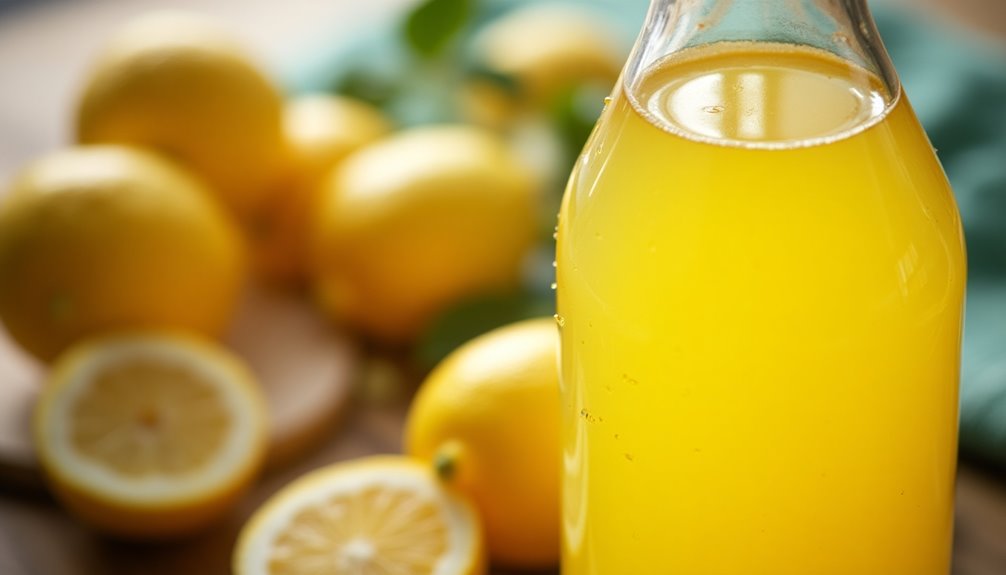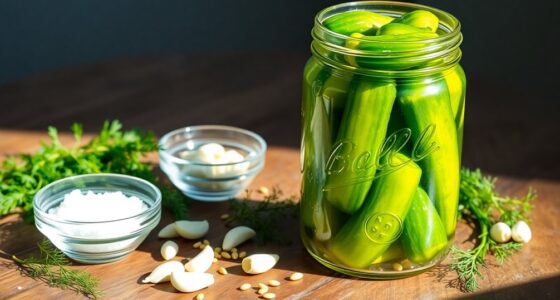Freshly squeezed lemon juice is good for about 3 to 4 days in the fridge, so store it in an airtight container to keep it fresh. If you've got store-bought lemon juice, unopened bottles can last 3 to 6 months in the pantry and opened bottles can last up to a year in the fridge. Always check for spoilage signs like cloudiness or an off smell. There's more to know about storage methods that can help!
Key Takeaways
- Freshly squeezed lemon juice lasts about 3 to 4 days in the refrigerator when stored in an airtight container.
- Store-bought lemon juice can last 3 to 6 months unopened in the pantry and up to a year once opened in the refrigerator.
- Signs of spoilage include a cloudy appearance, off smell, or unpleasant taste; discard if these are present.
- Freezing freshly squeezed lemon juice in ice cube trays can preserve quality for up to six months for future use.
- Whole lemons can last about a week or longer in the refrigerator when stored properly in an airtight container.

Lemon juice is a versatile ingredient that can brighten up recipes and drinks, but you might wonder how long it stays fresh. If you've just squeezed some lemons to make a refreshing drink or to enhance a dish, it's essential to know how to store that juice to maximize its freshness. Freshly squeezed lemon juice typically lasts about 3 to 4 days when stored properly in the refrigerator. To ensure it maintains its quality, always keep it in an airtight container. This minimizes exposure to air and helps preserve its flavor.
When it comes to store-bought juice, you have a bit more leeway. An unopened bottle of lemon juice can be stored in your pantry for about 3 to 6 months. Once you crack it open, however, the game changes. Opened bottled juice can last up to a year when kept in the refrigerator, making it a convenient option for your kitchen. If you find yourself using lemon juice frequently, this might be the way to go.
Just remember, regardless of whether it's freshly squeezed or store-bought, if you leave any lemon juice at room temperature, you should discard it after one day. Spoilage can happen quickly, and you don't want to risk your health.
It's crucial to watch for signs that lemon juice has gone bad. If you notice a cloudy appearance, an off smell, or a taste that's unpleasant, it's time to toss it. These signs often indicate that the juice is no longer safe to consume, so don't take any chances. Storing your lemon juice properly will help prevent these issues, but if you find yourself with more juice than you can use in a few days, there are ways to extend its shelf life.
For long-term storage, consider freezing your freshly squeezed lemon juice in ice cube trays. This method allows you to preserve the juice for up to six months without significant loss of quality. Once frozen, you can transfer the cubes into a zip-top bag or an airtight container, making it easy to grab a portion whenever you need it. This not only preserves the freshness but also ensures you can access the health benefits of lemon juice whenever you want.
If you enjoy cooking with lemons, storing them properly is just as important. You can keep whole lemons in the fridge, where they'll last about a week or even longer. If you want to stock up, consider using an airtight container.
Knowing how to store both fresh lemons and lemon juice will help you get the most out of this zesty ingredient, ensuring you always have a splash of citrus flavor on hand. So, whether you're sprucing up a dish or whipping up a refreshing drink, you'll be good to go with your well-stored lemon juice.
Frequently Asked Questions
How Can You Tell if Lemon Juice Has Gone Bad?
To tell if lemon juice has gone bad, look for a dark or cloudy color, which indicates spoilage.
Check for visible mold on the surface; if you see any, throw it away.
Trust your nose—an unpleasant sour or fermented smell is a bad sign.
Finally, taste a small amount; if it tastes bitter or unusually sour, it's best to discard it.
When in doubt, it's safer to err on the side of caution.
How Long Does Lemon Juice Last in Fridge?
When you store lemon juice in the fridge, you're ensuring its freshness, prolonging its life, and maintaining its flavor.
Freshly squeezed lemon juice typically lasts about 3 to 4 days.
If you've got bottled lemon juice, it can last longer—unopened for 3 to 6 months, opened for up to 9 months.
Just remember, if you notice off smells, cloudiness, or mold, it's time to toss it out.
Always prioritize your safety!
Can Lemon Juice Be Bad?
Yes, lemon juice can go bad. Once opened, it's exposed to air and microorganisms that can cause spoilage.
You might notice off tastes, smells, or even visible mold. If the juice looks cloudy or changes color, it's best to toss it.
Consuming spoiled lemon juice can lead to food poisoning, with symptoms like nausea and stomach cramps.
Always check for signs of spoilage before using it to stay safe.
How to Tell if Lemon in the Fridge Is Bad?
When it comes to your lemons, don't judge a book by its cover.
Check for any visible signs of mold or a change in color; if they're darker or cloudy, toss 'em.
Give them a sniff—if they smell off or bitter, it's time to say goodbye.
Lastly, if they taste sour or different from the usual tangy flavor, they've gone bad.
Always trust your senses to keep things fresh!
Conclusion
In conclusion, lemon juice can last about 2-3 days in the fridge once opened, but if you've got a sealed bottle, it can be good for months! Just remember, freshness is key—when it starts to smell funky or looks cloudy, it's time to toss it. So, keep an eye on it; you don't want your drink to taste like a sour sock! Enjoy that zesty flavor while it lasts!
Cindy thoroughly researches juicing trends, techniques, and recipes to provide readers with practical advice and inspiration. Her writing style is accessible, engaging, and designed to make complex concepts easy to understand. Cindy’s dedication to promoting the advantages of juicing shines through her work, empowering readers to make positive changes in their lives through the simple act of juicing.











